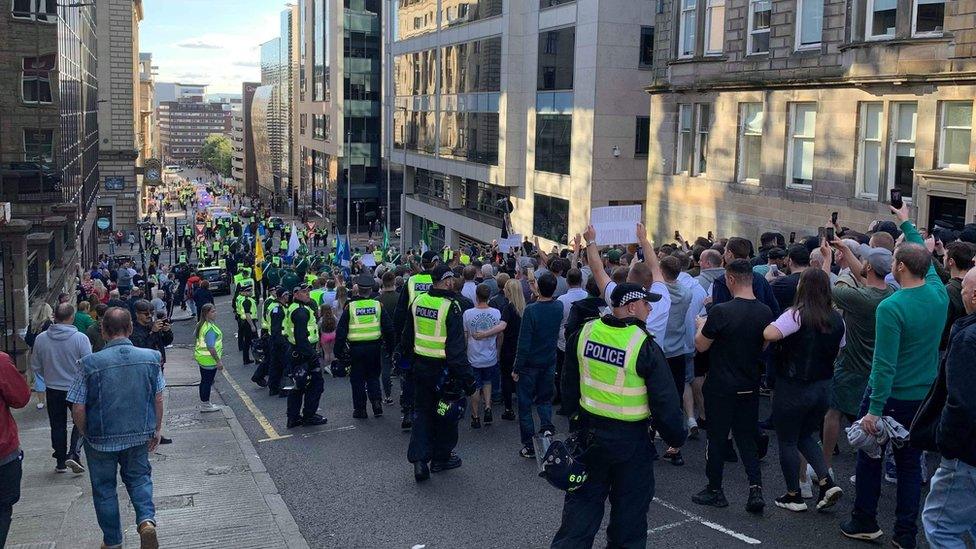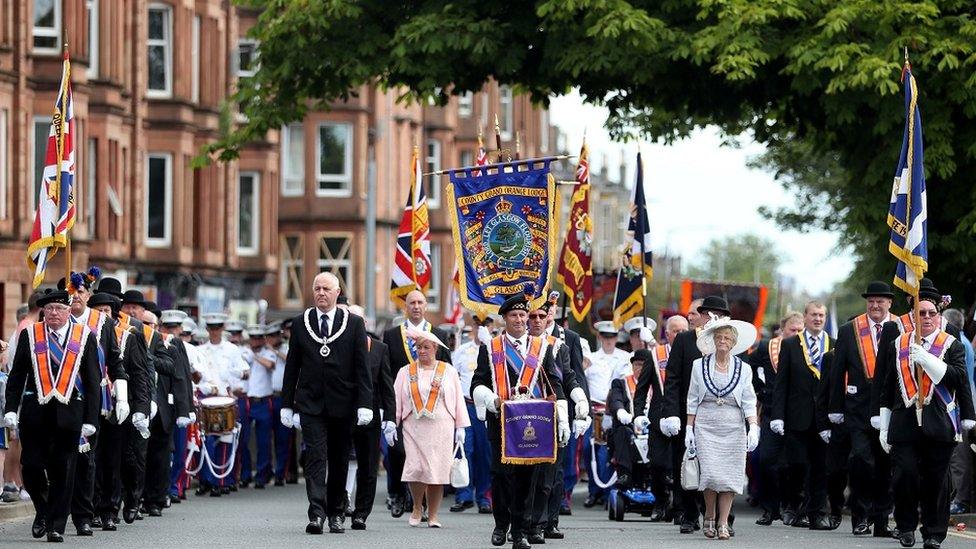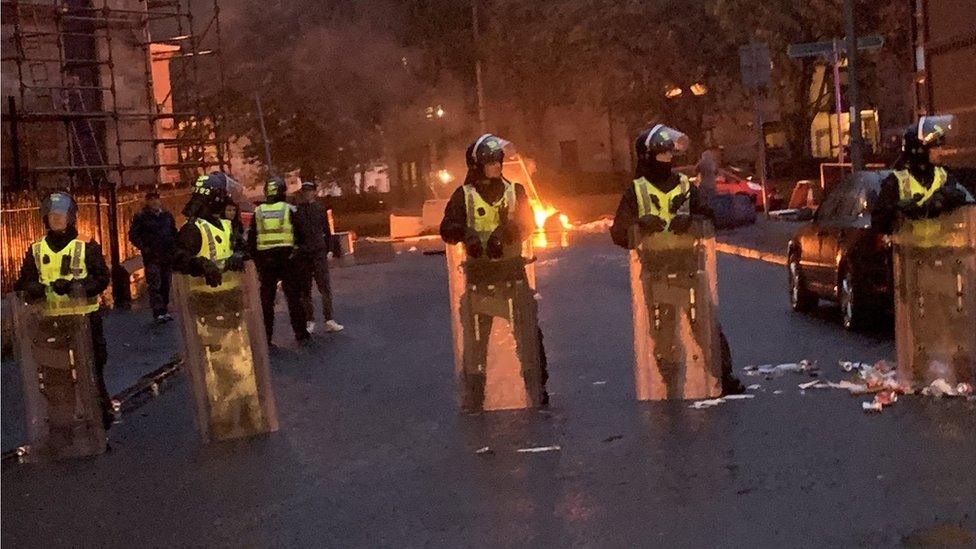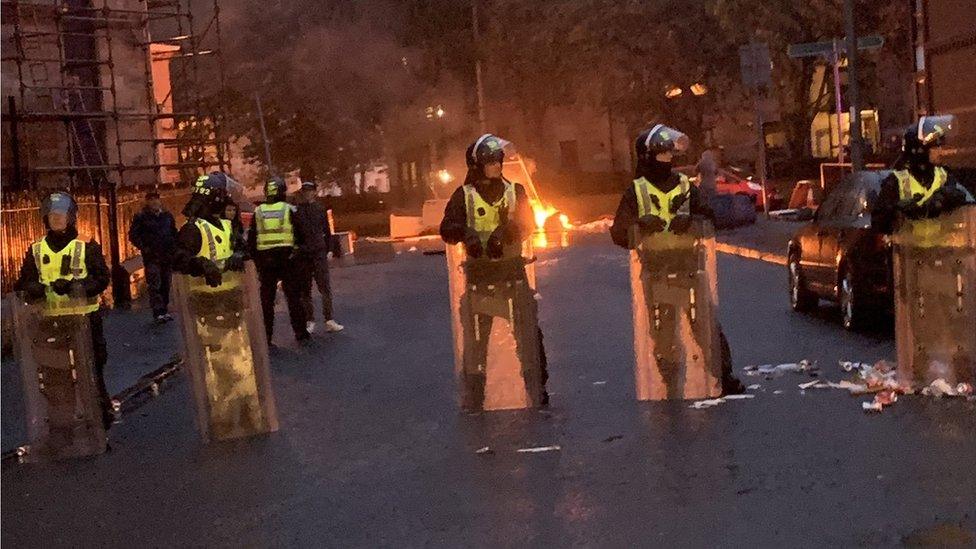Glasgow City Council looks at 'breathing space' ban on marches
- Published

About 1,000 people were involved in the marches and the counter protests last weekend
The leader of Glasgow City Council has instructed her teams to see if placing a temporary ban on all loyalist and republican marches "would be workable".
Susan Aitken said it would provide "breathing space" to find a long-term solution following recent disorder.
Four Loyalist marches and an Irish Republican parade planned for this weekend were banned by the council after a meeting on Wednesday.
But more marches are scheduled for the coming weeks.
The council's Public Processions Committee made the decision to prohibit the marches planned for Saturday and Sunday following serious sectarian disorder at similar events over the past two weekends.
The police had warned there was a strong likelihood of disorder and a large number of officers would be required.
Supt John McBride said there had been calls on social media from Republicans to target Loyalist events and demands from Loyalists to protest against Republican parades.
At a council meeting on Thursday, leader Ms Aitken said: "Community tensions are running high and more processions are planned for the weeks to come.
"[So} I have asked officers to consider every option available to us, including whether a moratorium on such marches in the interests of public safety would be workable and provide all stake holders with the breathing space needed to find a longer term solution."
At First Minister Questions at Holyrood, Nicola Sturgeon told MSPs the city council had made the "right decision" in banning the marches this weekend.
She added that the right to march was "an important part of our democracy" but those who were abusing it were putting it into jeopardy for others.
"It is also vital that the rights of the majority of law-abiding citizens are protected and given priority," Ms Sturgeon said.
However, the Orange Order hit out at the decision.
Jim McHarg, Grand Master of the Orange Lodge, said the move was "illegal" and called for protests outside the City Chambers on Saturday.

Planned Loyalist and Republican marches

The Orange Order accounts for the highest number of marches in the city
Saturday 14
Pride of the North Flute Band - 60 expected participants - prohibited
Bridgeton Protestant Boys Flute Band - 300 participants - prohibited
Republican Network for Unity - 150 participants - prohibited
Whiteinch Orange and Purple District 7 - 120 participants - prohibited
Sunday 15
Partick Orange and Purple District 15 - 60 participants - prohibited
Saturday 21
Independent Loyal Orange Order - starts 10:00 - 50 participants expected
Pride of Govan Flute Band - starts 10:00 - 800 participants
Drumchapel Orange and Purple District 57 - starts 11:00 - 120 participants
Springburn Campsie Apprentice Boys of Derry - starts 12:00 - 60 participants
West of Scotland Band Alliance - starts 12.30 - 200 participants
Friday 27
Govan Somme Association - starts 18:15 - 100 participants
Saturday 5 October
Orange and Purple District No12 LLOL1 - starts 15:00 - 110 participants
Saturday 12 October
Bridgeton No Surrender Flute Band - starts 13:00 - 350 participants
Royal Black Preceptory 672 - starts 10.25 - 50 participants

Sectarian disturbances

A march in Govan two weeks ago led to violent disorder
The council decided to prohibit the marches after violent sectarian disturbances on the two previous weekends.
On Saturday, a police officer was injured as two Irish Republican marches and Loyalist counter-demonstrations were held in Glasgow.
The counter demonstrations at both marches were quickly contained by police, who had deployed officers in riot gear and mounted police.
The heavy police presence came a week after a riot developed in Govan when Loyalists tried to disrupt another Irish Republican parade.
Mr McHarg, from the Grand Orange Lodge of Scotland, claimed there had been a "concerted campaign" by Irish republican-supporting groups to cause fear and alarm to the protestant communities of Glasgow.
He said: "Nationalist councillors in Glasgow, supported by Police Scotland, effectively weaponised these protests by sending out a message that they would use the threat of protests to ban protestant parades.
"This action led to the chaotic scenes in the streets of Glasgow as a hard-core element from both sides of the argument used this weaponised protest action against each other."
Mr McHarg said the Orange Order had played no part in any of the incidents in Glasgow in recent weeks.
He said the move to ban parades outright was "something we cannot ignore".
"We will not stand idly by whilst our democratic right of free assembly is curtailed by politically-motivated anti-unionist nationalists," he said.
Mr McHarg called on members to protest outside the City Chambers in Glasgow on Saturday morning.
A group called Scottish Protestants Against Discrimination had already arranged a demonstration at that time to protest against what they claimed was Glasgow City Council's decision to "discriminate" against certain processions.
- Published10 September 2019

- Published8 September 2019

- Published31 August 2019
